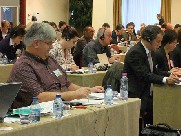News
Social Observatory Project – Final Conference

An extremely successful final conference of the social observatory project in the postal sector took place Thursday 22October. Using round tables and several individual presentations, 24 speakers from the Trade Unions, the Employers and the European Commission discussed the social impact of changes in the postal sector.
A common theme among the participants was how the future changes in the postal sector produced by automatisation, digitalisation and liberalisation would be dealt with. However there were differing views between countries and some of the UNI and Post-europ participants on how to cope with the changes, particularly on how to avoid social dumping, a decrease of jobs, and to maintain quality of services and social conditions.
It showed clearly that the difference in conditions in the postal sector in Europe is far with several different social models will make it difficult to deal with the social aspects of liberalisation. The strategies and definitions of the companies differ from country to country with the participants not in agreement on what constitutes social dumping and how to deal with it. UNI sees a huge problem if postal companies are not a living paying a wage and which forces the worker to ask for financial support by the state. Or where they are forced to have more than one job to have a basic standard of living. Some of the companies present didn’t agree and claimed that in their view social dumping was not taking place if the employer reduced wages to a minimum and changed the work into mainly part-time contracts. UNI strongly disagreed with this view.
A clear output of the discussion was that only the inclusion of the social partners in the changes and the development of further agreed strategies will ensure sustainable development. Social Dialogue on all levels is important to expand the ideas and views and to ensure the acceptance and the understanding of the workers. The changes may have been dealt with differently but the experiences presented showed very clearly that change was only successfully instigated when all stakeholders were included in decision marking processes.
The European Commission, represented by DG Internal Markets and DG Employment, also admitted the importance of Social Dialogue. While DG Internal Markets promoted the freedom of service provision with as few regulations as possible, DG employment is willing to strengthen Social Dialogue in the future. Jean Paul Tricart emphasised the importance for expanding Social Dialogues and to empower the Social Partners to negotiate agreements about social conditions on European level and build up committees for employment and training. He underlined the need for the Commission to get information from the social partners and on the other hand the possibilities they could have by influencing the European legislation.
UNI europa emphasised the importance of secure jobs and a competition based on innovation and quality instead of price. The examples of Belgium and the Netherlands where they had worked to reach agreement on workers contracts with all competitors before the market opening is a good example of how to ensure good working conditions and decent salaries in the sector. But this isn’t the case in the majority of the countries. Especially in times of crisis, the speed of changes and the pressure on making unsatisfactory changes is higher. “The European Commission has invested a lot in studies in all aspects of the market opening except on how to regulate working standards”, says Neil Anderson, Head of Department of UNI Post & Logistics. He addressed to the European Commission to “Stop the liberalisation until you have done this”. He said UNI demands good social agreements and regulation including all competitors before the market opening!

